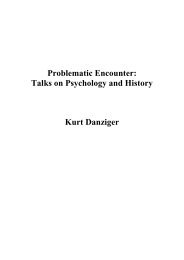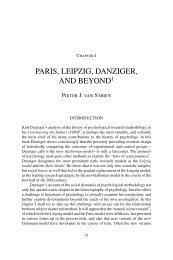The positivist repudiation of Wundt - Kurt Danziger
The positivist repudiation of Wundt - Kurt Danziger
The positivist repudiation of Wundt - Kurt Danziger
Create successful ePaper yourself
Turn your PDF publications into a flip-book with our unique Google optimized e-Paper software.
208 KURT DANZIGER<br />
heuristic device to bridge temporary gaps in our knowledge <strong>of</strong> psychic causes. In principle,<br />
psychological events must be understood as the effects <strong>of</strong> psychological causes. <strong>The</strong><br />
ultimate task <strong>of</strong> a science <strong>of</strong> psychology therefore becomes the explication <strong>of</strong> the principles<br />
which establish the fundamental manifestations <strong>of</strong> psychic causality, just as<br />
physical science is concerned with establishing the principles <strong>of</strong> physical causality.<br />
<strong>Wundt</strong>’s mature psychological texts, the Outlines and the later editions <strong>of</strong> the Grundziige,<br />
both culminate in a statement <strong>of</strong> these principles as he saw them. In the present<br />
context it is not necessary to enumerate these principles - the point at issue between<br />
<strong>Wundt</strong> and his opponents did not concern the specific content <strong>of</strong> the principles <strong>of</strong> psychic<br />
causality but rather the question <strong>of</strong> whether it was the business <strong>of</strong> psychology to look for<br />
such principles at all.7<br />
<strong>The</strong>re is one feature <strong>of</strong> Wupdt’s principles <strong>of</strong> psychic causality, however, which was<br />
closely related to the question <strong>of</strong> what kind <strong>of</strong> science psychology was to be. <strong>The</strong> two<br />
types <strong>of</strong> causality, according to <strong>Wundt</strong>, entail a crucial difference between the type <strong>of</strong> explanation<br />
characteristic <strong>of</strong> the natural sciences and that characteristic <strong>of</strong> the<br />
Geisteswissenchaften. Explanations in terms <strong>of</strong> physical causation lead to predictions,<br />
while explanations in terms <strong>of</strong> psychic causality are generally post hoc: “Thus, on the<br />
physical side it is possible to predict effects, in simple cases, from a combination <strong>of</strong><br />
causes which has never before been observed; on the psychic side this is impossible, even<br />
in the simplest cases, for here prediction is only possible from like to like, which means<br />
that prediction is quite out <strong>of</strong> the question for all complex psychological processes.”<br />
Even <strong>Wundt</strong>’s physiological psychology belongs only “half’ to the natural sciences,<br />
for its task is also to mediate between the latter and the Geisteswissens~haften.~ His own<br />
evaluation <strong>of</strong> his contributions in this area was determined by his conception <strong>of</strong> the place<br />
<strong>of</strong> psychology in the system <strong>of</strong> the sciences. As a natural science, psychology has simply a<br />
supplementary role, but as a Geisteswissenschaft “it is once the most general mental<br />
science, and the foundation <strong>of</strong> all the others.”’O<br />
Typically, these <strong>Wundt</strong>ian perspectives are not reflected in standard accounts <strong>of</strong> his<br />
role in the history <strong>of</strong> psychology. Though there may be some mention <strong>of</strong> the fact that<br />
<strong>Wundt</strong> also made certain contributions outside experimental psychology, the picture<br />
presented is one <strong>of</strong> addition or juxtaposition: in addition to his work in experimental psychology,<br />
he also wrote books on philosophy, psycholinguistics, and so on. What is lost<br />
from view here is that these other areas were crucial for defining <strong>Wundt</strong>’s view <strong>of</strong> the<br />
proper scope and limits <strong>of</strong> experimental psychology.<br />
What the account <strong>of</strong>fered in standard histories <strong>of</strong> modern psychology actually<br />
reflects is the perspective <strong>of</strong> the generation that followed <strong>Wundt</strong>, a generation that included<br />
some <strong>of</strong> his most prominent students. It was their philosophy <strong>of</strong> science, not<br />
<strong>Wundt</strong>’s, which became characteristic for the mainstream <strong>of</strong> academic psychology.<br />
<strong>The</strong> “New Psychology” <strong>of</strong> Kiilpe, Mach, and Avenarius<br />
<strong>The</strong> public event which signalled the turn from <strong>Wundt</strong>’s conceptions <strong>of</strong> the scope<br />
and nature <strong>of</strong> psychology was the appearance <strong>of</strong> Oswald Kiilpe’s Grundriss der<br />
Psychologie in 1893. Kiilpe was not merely <strong>Wundt</strong>’s assistant, he was a Privatdozent and<br />
looked after the psychology lectures at Leipzig during the periods when <strong>Wundt</strong>’s<br />
teaching activity was concentrated on philosophy. <strong>Wundt</strong> treated him as his right-hand<br />
man, and it appears that the instigation for Ktilpe’s book had come from <strong>Wundt</strong> who<br />
needed an introductory textbook for his large and steadily increasing classes.<br />
Nevertheless, when it appeared, the book was a considerable disappointment to <strong>Wundt</strong>. l1





